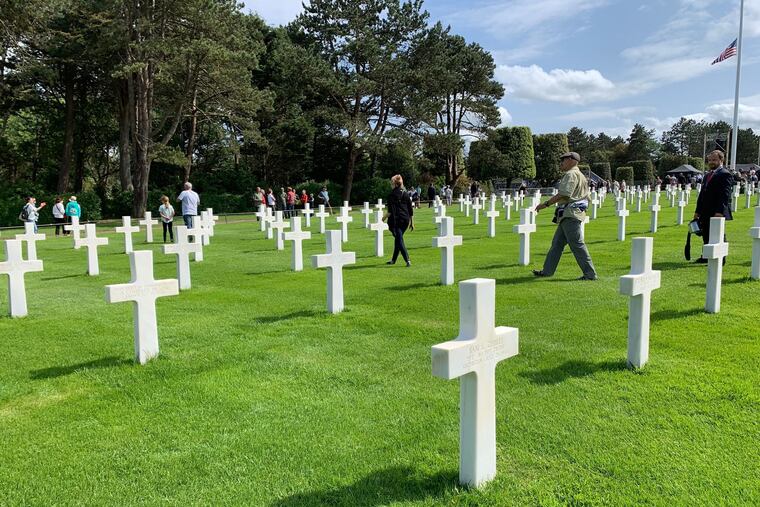75th anniversary of D-day: A visit to the Normandy cemetery reminds us of the values thousands died for | Trudy Rubin
A trip to the American Cemetery in Normandy above Omaha Beach reminds us of an era where honor and sacrifice for country had meaning - including for presidents.

Editor’s note: On Monday, foreign affairs columnist Trudy Rubin visited the Normandy American Cemetery in advance of the 75th anniversary of D-Day. President Trump and other world leaders gathered in Northern France on Thursday to honor this important day in history. Read live updates here.
COLLEVILLE-SUR-MER, France — One of the first things I noticed as I drew near to the Normandy American Cemetery were the banners with faces of young Americans who died taking back the beaches from the Nazis.
Workers were busy on Monday roping off paths and setting up tents for the heads of state who will gather on June 6 to celebrate the 75th anniversary of D-Day.
But it is the banners that mesmerize. Hanging from roadside poles, they read, “Never Forget/Ne Jamais Oublier, WWII Heroes.” Many portray U.S. Army Rangers who were mowed down as they attempted to scale the sheer, desolate cliffs at Pointe du Hoc, where huge Nazi guns were trained on both Omaha and Utah beaches.
On the long sandy path to the Pointe, still lined with shell craters, descriptive markers were all underlined with a single word in capital letters: “SACRIFICE.” When the rangers finally took the cliffs after two days of fighting, only 90 of 225 could still bear arms.
The banners and markers serve to humanize the stark rows of 9,337 plain white crosses (and several scores of Jewish stars) that crisscross brilliant green grass and overlook the (now) deserted sands of Omaha beach. Doing justice to those heroes puts a heavy responsibility on the shoulders of any leader who speaks on June 6, the 75th anniversary of D-Day.
Especially President Trump.
The further away we get from D-Day, the easier it is to forget what that day stands for. The thousands of soldiers who died on these beaches didn’t give their lives for money, or profits, or deals, or to glorify their brand.
They were fighting for country and to defend democracy against the advance of fascism: a racist, uber nationalist ideology that glorified a Nazi strongman who sought total control of Europe. And they were fighting alongside Britons and Canadians and other European allies.
D-Day was a battle for democracy’s survival, both in America and Europe. Any speech celebrating D-Day’s success, 75 years on, must be infused with an appreciation for the current threats to democracy and the values for which these heroes died.
This presents an obvious challenge to Trump.
I don’t just refer to Trump’s avoidance of military service in Vietnam by getting diagnosed with bone spurs. Neither President Clinton nor President Obama (who was 12 years old when the draft ended) served.
But no previous president has Trump’s history of insulting genuine war heroes, from Gold Star parents to the late Sen. John McCain. Trump, you will recall, called McCain a “loser” because he had been captured and imprisoned in Hanoi. The week before D-Day, a White House aide requested that the Navy hide the destroyer U.S.S. John S. McCain from Trump’s sight during his visit to Japan. (The ship was named in honor of the late senator’s father and grandfather who were both admirals.)
When asked about the episode, the president justified it. He said whoever made the request was “well-meaning … because they thought I didn’t like him [McCain].“ In other words the president’s pique justifies hiding a ship named for military heroes.
How does such narcissism square with the sacrifice of the over 9,000 Americans who lost their lives on June 6, 1944, and in the operations that followed?
Equally disturbing is the president’s seeming indifference to the values that those soldiers died for. He directs a litany of insults at democratic allies, while dispensing ready praise for the world’s worst autocrats, from Russia’s Vladimir Putin to North Korea’s Kim Jong Un to Hungarian President Viktor Orban.
Even the Brits, whom the president praised in a three-day state visit, amid photo ops with Queen Elizabeth and the royal family, don’t emerge unscathed. Trump has been busy promoting Britain’s Brexit from Europe, and the leaders who lie about its benefits — even though Brexit will weaken the Western alliance that WWII victories built.
Arriving briefly for the Normandy ceremony, Trump may never see the U.S. and French flags flying side by side on lampposts and in front of private homes all along narrow roads. Those warm memories aren’t reflected in Trump’s often dismissive attitude towards French president Emmanuel Macron.
One can only hope that some brave Trump aide will convince the president to take a look at Ronald Reagan’s speech at Pointe du Hoc on the 40th anniversary of D-Day.
“The strength of America's allies is vital to the United States, and the American security guarantee is essential to the continued freedom of Europe's democracies,” Reagan said. “We've learned that isolationism never was and never will be an acceptable response to tyrannical governments with an expansionist intent.”
The passage of 75 years hasn’t dimmed the need to appreciate the meaning of military sacrifice and the value of democratic allies — more important than ever in the age of China rising and Russia meddling.
As I looked down at Omaha Beach, so peaceful now, and listened to the eerie beauty of “Taps,” I could only hope that Trump might grasp a tiny bit of what this place conveys.